Nowadays, it seems like everybody’s going global. Here in the College of Arts and Sciences, we’re doing our part to cross the continents, too, with faculty and students making their mark in more places than we can mention in a single article: Greece, Nigeria, Japan, Belgium, England, Spain, India, the Netherlands, Turkey, Brazil, Egypt, The Republic of Korea—the list goes on.
Whether we travel virtually or touch down on runways thousands of miles away we know that going global requires passion and purpose. In the pages that follow, we’ll introduce you to a smorgasbord of efforts in the College of Arts and Sciences to contribute to the kind of knowledge that’s shaping our world and changing it for the better.
Hitting the Road
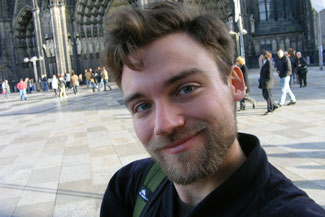 Andrew Demshuk Perhaps the most conventional sense of going global involves, well, going global in the literal sense. Every year, representatives from The College set their sights on other shores. For many faculty members and graduate students, the goal is to conduct research elsewhere and then deliver their findings to stakeholders situated around the globe.
Andrew Demshuk Perhaps the most conventional sense of going global involves, well, going global in the literal sense. Every year, representatives from The College set their sights on other shores. For many faculty members and graduate students, the goal is to conduct research elsewhere and then deliver their findings to stakeholders situated around the globe.Historian Andrew Demshuk is a good example. Demshuk was thrilled to be named a recipient of the coveted Humboldt Foundation Junior Faculty Research Fellowship for 2014-15. The fellowship supports a full year of research on the history of architecture and city planning after World War II in Frankfurt am Main, Leipzig, and Wroclaw—“three war-ravaged cities which were part of united Germany before 1945 and then reconstructed under three differing regime ideologies during the decades thereafter,” according to Demshuk.
The project will take Demshuk to several research sites, including the national library in Leipzig and the archive of the former East German secret police. It’s an experience that’s a dream come true for this young scholar who published a book called The Lost German East with Cambridge University Press in 2012. But for Demshuk, living and working in Germany is about more than contributing to a scholarly conversation.
“My most memorable experiences in Germany have involved a plethora of close friends and colleagues who live in beautiful places across the country,” he says. He counts among his dearest friends those who hail from “Berlin in the East, to the Ruhr region in the West, to the countryside around Schwabish Hall in the South, to Oldenburg near the Dutch border,” and says that the conversations and experiences he’s shared with friends have enabled him to “enter diverse world views that continue to enrich [his] own.”
Demshuk advocates for more overseas interchange and scholarship in the 21st century: “Americans need to learn more languages, meet people from other cultures, exchange ideas, take in alternative methods and outlooks, immerse in the great wealth of foreign research materials, and then carry that new richness back home to share.”
Coming Together
Complex global issues require the meeting of many minds. Unsurprisingly, folks in the College of Arts and Sciences are part of numerous conversations about real-world problems, from global warming to human rights to health concerns that affect people just about everywhere.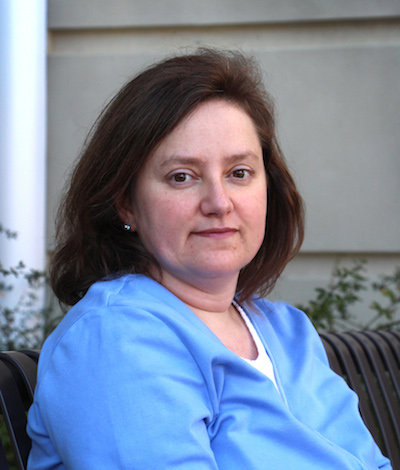 Lisa SharlachAs a case in point, Department of Government’s Lisa Sharlach considers the impact of war on women in conflict zones around the globe. Currently, she’s investigating the link between sexual violence in conflict (what’s considered the macro-level) with sexual violence in times of so-called “peace” (the micro-level). “The question I’m asking,” Sharlach says, “is whether the war ends for women when peace comes.”
Lisa SharlachAs a case in point, Department of Government’s Lisa Sharlach considers the impact of war on women in conflict zones around the globe. Currently, she’s investigating the link between sexual violence in conflict (what’s considered the macro-level) with sexual violence in times of so-called “peace” (the micro-level). “The question I’m asking,” Sharlach says, “is whether the war ends for women when peace comes.”Her present project is cross-cultural, focusing on trends across a number of global contexts, while other projects have centered on happenings in particular places. Sharlach says that much of her work addresses women’s victimization in war, but she also looks at “women’s roles as ‘villains,’ or perpetrators of war crimes.” One example is her research on the involvement of ordinary Hutu women in the Rwandan genocide. She’s also engaged in an ongoing analysis of the depiction of women as strong, feminist warriors in propaganda from North Korea and Eritrea—while scratching beneath the surface to uncover a very different message that elevates male dictators.
Sharlach strives to avoid what she calls “U.S. exceptionalism” in both her teaching and research, the notion that somehow the way we do things in the U.S. is different than anywhere else around the globe. “What happened in our Civil War is really little different than what’s currently going on in the Ukraine, for instance,” she offers as an example.
Fortunately, Sharlach finds UAB students to be well positioned to learn about international conflict. “We have a very diverse and international population, many of whom come from or have family members living in war-torn parts of the world,” she says. And the number of students who have served or plan to serve in the military makes them innately curious to learn as much as they can about where the U.S. military might be headed next.
Opening Our Doors
Throughout the year, CAS hosts a number of experts, artists and notable world leaders. By bringing these global thinkers and doers to us, we connect with people from around the globe without leaving home.For example, the Department of Music hosted several lectures and performances by leaders in the music industry, including legendary Beatles recording engineer Ken Scott, blues guitarist Bill Sims, Jr., and world-renowned percussionist Michael Burritt.
And the Computer Science (CIS) has had their share of visiting scholars, too. “Dr. Marjan Mernik, Professor, University of Maribor is one of many scholars whom we have hosted over the last few years,” says associate professor Dr. Purushotham Bangalore. “Dr. Mernik has taught classes and served as a member of the dissertation committees for several CIS Ph.D. students. He has also co-authored several papers with faculty and students from CIS and served as a co-project investigator on some NSF-funded grants.”
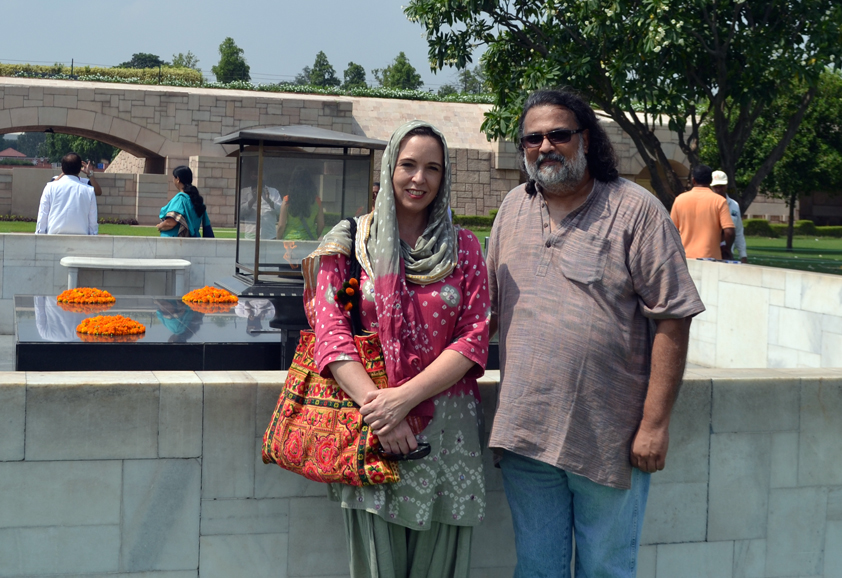 Cathleen Cummings and Tushar Gandhi Sometimes, faculty meet people on their own professional travels, and those connections lead to a return visit to UAB by the international figure. When Art History’s Cathleen Cummings met Tushar Gandhi, great-grandson of Mahatma Gandhi, during a 2013 National Endowment for the Humanities Summer Institute in New Delhi, India, she quickly realized how valuable his perspective might be to folks in Birmingham—especially during the city’s celebration of the 50-year anniversary of the Civil Rights Movement. Tushar spent several days with Cummings’ group, taking them to Birla House, where his great-grandfather was assassinated, and to Raj Ghat, where Gandhiji was cremated and where his ashes are interred.
Cathleen Cummings and Tushar Gandhi Sometimes, faculty meet people on their own professional travels, and those connections lead to a return visit to UAB by the international figure. When Art History’s Cathleen Cummings met Tushar Gandhi, great-grandson of Mahatma Gandhi, during a 2013 National Endowment for the Humanities Summer Institute in New Delhi, India, she quickly realized how valuable his perspective might be to folks in Birmingham—especially during the city’s celebration of the 50-year anniversary of the Civil Rights Movement. Tushar spent several days with Cummings’ group, taking them to Birla House, where his great-grandfather was assassinated, and to Raj Ghat, where Gandhiji was cremated and where his ashes are interred. “Over lunch one day we talked about what was going on in Birmingham and about Gandhian influences on the Civil Rights Movement,” Cummings says. “Tushar shared a couple of interesting anecdotes about Dr. Martin Luther King, Jr.’s visit to India that I had never heard and I began thinking how interesting it would be if he could share them with the community.”
With the collaboration of many in the College, Tushar’s visit was arranged in early May 2014. During his weeklong visit, Tushar participated in a symposium focusing on Gandhian paths to global progress and gave a public lecture at UAB. He also made presentations at the Rotary Club in Birmingham, visited several local grade schools to engage with area youth, spoke to an audience at Miles College, and recorded an extensive audio piece for the audio archive at the Birmingham Civil Rights Institute.
In addition to bringing an important figure to our community, Cummings’ invitation resulted in something far more lasting. “His visit helped to keep the momentum going in terms of the commemoration and recognition of Birmingham’s Civil Rights history,” Cummings offered. “Tushar’s perspective helped to renew our focus on important issues into 2014 and served as a kind of bridge between the 2013 events and the Dalai Lama’s upcoming visit in October.”
Providing a Voice
Globalization is often about offering perspectives other than the one on the ground. For many faculty, perspective-sharing happens in a unique ways.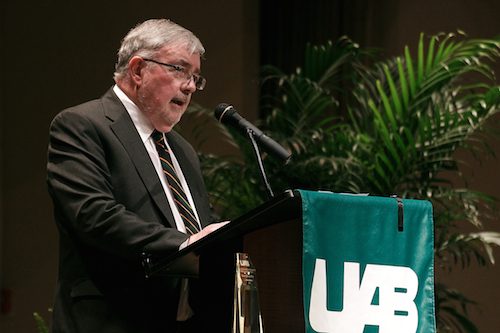 Kieran Quinlin There are those instances when our faculty and students share a global perspective on their particular field of study with folks in Birmingham or other parts of Alabama. Some examples from history include John Van Sant’s presentation on “Protocol in Practice Seminar: Japan” at the Birmingham International Center and Walter Ward’s talks about the Middle East at Avondale Library, several events on UAB’s campus, and for a story about the conflict between Israel and Hamas in Gaza for NBC 13.
Kieran Quinlin There are those instances when our faculty and students share a global perspective on their particular field of study with folks in Birmingham or other parts of Alabama. Some examples from history include John Van Sant’s presentation on “Protocol in Practice Seminar: Japan” at the Birmingham International Center and Walter Ward’s talks about the Middle East at Avondale Library, several events on UAB’s campus, and for a story about the conflict between Israel and Hamas in Gaza for NBC 13.Many times, faculty offer perspectives on the ideas being presented by colleagues around the world. They serve as reviewers for international journals, for example, mathematics’ Mubenga Nkashama’s appointment as an editorial board member for the International Journal of Evolution Equations and African Diaspora Journal of Mathematics, and Marshall Abrams’ position as associate editor of Frontiers in Evolutionary and Populations Genetics. Others occupy important roles in international organizations, like William Cockerham’s appointment to president of the research committee on health sociology for the International Sociological Association, and Akhlaque Haque’s service on the boards of the Bangladesh Development Initiative as well as the Section on Effective Administration of the Middle East for the American Society for Public Administration.
Then there are individuals like Glenn Feldman, who brings a sense of Birmingham’s history to scholars and media representatives across the globe. Writing about history in the American South, especially during the era of Civil Rights, Feldman has been interviewed about his work for outlets in Canada, England, Scotland, and The Netherlands.
And English professor Kieran Quinlan’s essay, “Kirwan Street, In Memory,” published in New Hibernia Review, a multidisciplinary journal of Irish studies from the University of St. Thomas, was named one of the Best American Essays in 2013 alongside prose by international literary figures including Jhumpa Lahiri. The essay depicts Quinlan’s experiences growing up on a street situated between a convent and an asylum in Dublin, and his decision to join (and then leave) the Trappist monastery of Mount Melleray. His work offers a commentary on the significance of place and identity that has proven to be relatable to people everywhere.
 Minabere Ibelema When readers of Nigeria’s popular newspaper The Punch open the Sunday edition, they are likely to discover commentary by UAB communications professor Minabere Ibelema. A native of Nigeria, Ibelema had steadily contributed essays to both U.S. and Nigerian papers and magazines when a friend suggested that he try landing a regular column in The Punch, which he did in 2008.
Minabere Ibelema When readers of Nigeria’s popular newspaper The Punch open the Sunday edition, they are likely to discover commentary by UAB communications professor Minabere Ibelema. A native of Nigeria, Ibelema had steadily contributed essays to both U.S. and Nigerian papers and magazines when a friend suggested that he try landing a regular column in The Punch, which he did in 2008.Over the years, Ibelema has tackled a number of general topics: serendipity and success, the value of the scientific method (in contrast with superstition) in everyday life, risk-taking in child-rearing, and “even the worn topic of adversity and character building,” he says. While issues related to life and society were the focus of many of his early columns, Ibelema admits that he found himself writing about politics more than he initially intended given Nigeria’s “perennial political tension” and a host of world crises affecting the country. The two thrusts of his political columns tend to be “bridging the partisan divide in Nigeria and interpreting Nigerian affairs so that readers see the global dimension” to what they are experiencing.
Several of Ibelema’s columns have struck a chord with readers. One example was a piece in which he was critical of Nigeria’s now-late literary icon, Chinua Achebe. “His retrospective on the Nigerian civil war, There Was a Country: A Personal History of Biafra, set off considerable controversy because of some very divisive and misleading claims,” Ibelema explains. “Though I cut my teeth on literature reading his novels, I weighed in decidedly against Achebe, pointing out historical evidence against his claims.” Ibelema received a good amount of feedback on the column, both supportive and critical, and ended up penning a follow-up to further elaborate on his position.
Ibelema says that “one of the downsides of living abroad is the feeling that one is not contributing to the civic and political discourse of one’s native country.” Fortunately, writing the column in The Punch has helped to fill this gap—as pointed out to Ibelema by some post-graduate Nigerian students who came to UAB already familiar with Ibelema’s work in their home country.
Thinking Big
At the end of the day, everything we do in the name of globalization has a larger purpose—to make a difference in as many places in the world as possible and to encourage the next generation of researchers, teachers, and students to keep their eyes on the world.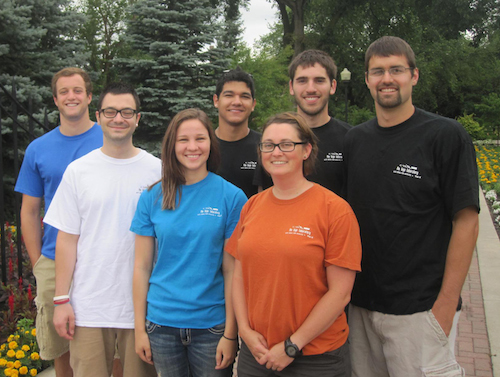 Peggy Biga with some of her students Peggy Biga in Biology is one such case. Working with two researchers from France, Biga is studying the genetic factors that allow for some animals to continually add new muscle fibers throughout their lives, while others (like humans) cannot. To find answers, this international team is looking to what might seem an unlikely source: fish.
Peggy Biga with some of her students Peggy Biga in Biology is one such case. Working with two researchers from France, Biga is studying the genetic factors that allow for some animals to continually add new muscle fibers throughout their lives, while others (like humans) cannot. To find answers, this international team is looking to what might seem an unlikely source: fish. In her lab at UAB, Biga juxtaposes two species of fish that exhibit opposing growth potential to help identify novel targets for growth regulation. During the past year and a half, Biga has collaborated with Jean-Charles Gabillard from the Institut de la Recherche Agronomique, INRA, Rennes, France; and Iban Seiliez from the Institut de la Recherche Agronomique, Saint-Pée-sur-Nivelle, France and their findings have resulted in a number of research articles. In addition to bringing expertise in particular aspects of muscle growth to their investigative work, both Gabillard and Seiliez are also experts in fish muscle biology.
“For the first time,” Biga says, “we have characterized an epigenetic profile of myogenesis (muscle growth) in vertebrates with no growth plateau growth potential.” Turning their attention to nutrition, the researchers are examining the role specific nutrients play on local muscle regulation through protein:DNA interactions. Their work has implications for a number of fields, including basic biology, agriculture and medicine, and Biga credits the international collaboration she shares with Gabillard and Seiliez for the progress her lab has made in addressing several complicated questions about organismal growth.
Graduate students working in Biga’s lab, as well as those in her collaborators’ institutions, are also benefiting from the research being conducted. Ph.D. student Jacob M. Froehlich had the opportunity to travel to France for two months to undergo one-on-one training in muscle biology research with Biga’s collaborators, and Biga says there are plans to send others to France in the future. Collaborators’ frequent visits to one another’s labs also expose UAB students to the expertise, and perspectives, of international scientists.
Biga and many others in the College of Arts and Sciences are at the forefront of globalization efforts, helping their students, their peers, and the larger community reap the benefits of their far-reaching relationships and partnerships with an eye to establishing many more in the future.
Study Away
As UAB and its students embrace a more globalized world, the number of College students pursuing study away opportunities is on the rise. In 2013, 509 UAB students studied away.UAB students interested in Study Away programs have four options. The first is an exchange program. UAB partners with 10 programs in 10 countries to basically swap a UAB student for a student from one of the partner schools for a semester. This program allows UAB students to pay UAB tuition and fees while having an abroad learning experience. UAB also partners with programs in the United States, Canada and the U.S. Territories to do similar exchanges, although these are domestic in nature. A business major can pay his or her in-state UAB tuition while studying in Calgary, if he or she so desires. Students who can’t find a fit in one of the exchange programs can arrange to study abroad through a third party provider. While this third option is often more expensive, the choices for what and where to study abroad are limitless. Students choose from programs and schools all across the globe.
The fourth option for students interested in study away programs is the increasingly-popular faculty-led study away. Many UAB professors embrace the opportunity to combine classroom learning with hands-on experience in a foreign country. Often offered on a shorter-term basis, these faculty-led study away programs can be an ideal match for students with work or family commitments that prevent leaving town for an entire semester. For example, a sustainability class explored alternative energy sources in a classroom on campus before heading to the Netherlands and Belgium for a look at wind farms and bike factories in places where earth-friendly practices are world-renowned.
Dr. Brian Johnson, Director of the Office for Study Away, believes these programs are invaluable to students as they enter an ever-changing world and competitive job market. “Study Away prepares students to succeed in the globalized world,” he says.
“Students in all fields—from the humanities to the hard sciences—can benefit from spending time in a different culture. Study Away demonstrates cultural competency and that a student can survive independently,” Johnson says. “It shows you can thrive in an environment you’re not completely used to.”


